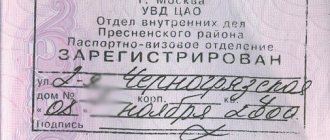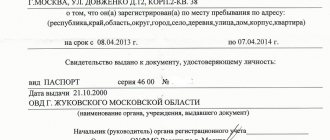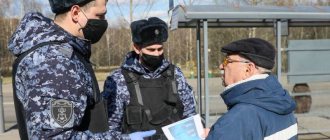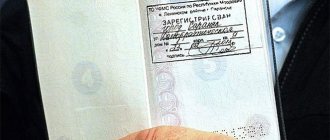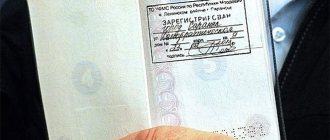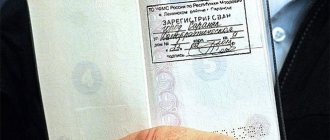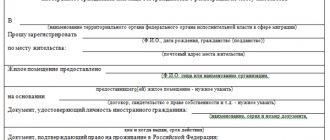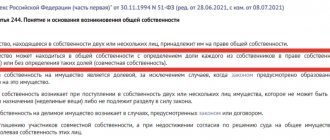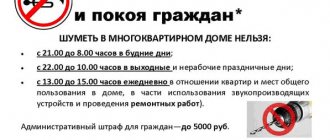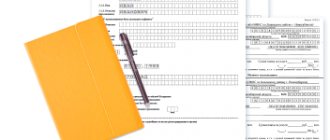Law of the Russian Federation of June 25, 1993 N 5242-1
Article 1. The right to freedom of movement, choice of place of stay and residence within the Russian Federation.
In accordance with the Constitution of the Russian Federation and international human rights acts, every citizen of the Russian Federation has the right to freedom of movement, choice of place of stay and residence within the Russian Federation. Restrictions on the right of citizens of the Russian Federation to freedom of movement, choice of place of stay and residence within the Russian Federation are permitted only on the basis of law. Persons who are not citizens of the Russian Federation and are legally located on its territory have the right to freedom of movement, choice of place of stay and residence within the Russian Federation in accordance with the Constitution and laws of the Russian Federation and international treaties of the Russian Federation.
Article 2. Basic concepts.
For the purposes of this Law, place of stay and residence means place of stay and place of residence. Place of residence - a hotel, sanatorium, holiday home, boarding house, camping, tourist center, hospital, other similar institution, as well as residential premises that are not the citizen’s place of residence - in which he resides temporarily. Place of residence - a residential building, apartment, service residential premises, specialized houses (dormitory, hotel-shelter, house of maneuverable fund, special home for single elderly people, boarding house for the disabled, veterans and others), as well as other residential premises in which a citizen permanently or primarily resides as an owner, under a lease (sublease), lease agreement or on other grounds provided for by the legislation of the Russian Federation.
Article 3. Registration of citizens of the Russian Federation at the place of stay and place of residence within the Russian Federation.
In order to ensure the necessary conditions for a citizen of the Russian Federation to exercise his rights and freedoms, as well as to fulfill his duties to other citizens, the state and society, registration of citizens of the Russian Federation at the place of stay and at the place of residence within the Russian Federation is being introduced. Citizens of the Russian Federation are required to register at their place of stay and place of residence within the Russian Federation. Registration or lack thereof cannot serve as a basis for restriction or a condition for the implementation of the rights and freedoms of citizens provided for by the Constitution of the Russian Federation, the laws of the Russian Federation, the Constitutions and laws of the republics within the Russian Federation. For registration of citizens of the Russian Federation at their place of residence within the Russian Federation, a state fee is charged in accordance with the Law of the Russian Federation “On State Duty”. The rules for registration and deregistration of citizens of the Russian Federation at the place of stay and place of residence within the Russian Federation, as well as the list of officials responsible for registration, are approved by the Government of the Russian Federation. Control over compliance by citizens of the Russian Federation and officials with the rules of registration and deregistration of citizens of the Russian Federation at the place of stay and place of residence within the Russian Federation is assigned to the internal affairs bodies.
Article 4. Registration bodies for citizens of the Russian Federation at the place of stay and place of residence within the Russian Federation.
In cities, towns, rural settlements, closed military camps, as well as in settlements located in the border strip or closed administrative-territorial entities in which there are internal affairs bodies, registration authorities of citizens of the Russian Federation at the place of stay and at the place of residence within the Russian Federation are the internal affairs bodies, in other settlements - the local administration.
Article 5. Registration and deregistration of a citizen of the Russian Federation at the place of residence.
Registration of a citizen of the Russian Federation at the place of residence is carried out without deregistration at the place of residence. Registration and deregistration of a citizen of the Russian Federation at the place of stay in a hotel, sanatorium, holiday home, boarding house, camping site, tourist base, hospital, or other similar institution are carried out upon his arrival and departure by the administration of the relevant institution. In other cases, registration and deregistration of a citizen at the place of residence are carried out by the registration authority in accordance with the rules approved by the Government of the Russian Federation.
The procedure for registering citizens of the Russian Federation at their place of residence
The procedure for registration at the place of residence for Russian citizens consists of the following steps:
- Drawing up an application for deregistration from the current place of registration.
- Next, you need to go through the deregistration procedure. To do this, you need to appear with the necessary documents at the Federal Migration Service or other competent authority that carries out these procedures at your place of residence. Based on the provided papers, a disposal sheet is drawn up, after which the citizen fills out a registration form, which confirms the fact of deregistration.
- The next step is to submit documents to the relevant authorities for registration at a new place of long-term stay. In addition to the package of documents, all family members over 14 years old who are participating in the re-registration must come to the FMS registration office. After checking the papers, if they are filled out correctly, they are handed over to the head of the department, who carries out registration and indicates how long it takes to pick up the documents;
- The completed papers are issued to any family member undergoing the registration procedure against signature.
The rules for registration at the place of residence are established by the following legislative acts:
- Law No. 5242-1 “On the right of citizens to freedom of movement”;
- Constitution of the Russian Federation;
- Housing Code of the Russian Federation;
- Decree of the Government of the Russian Federation No. 713 of July 17, 1995 “On approval of registration rules.”
Subjects of the Russian Federation may establish additional features of the registration procedure, but the steps listed are basic and apply throughout the entire country and its constituent entities.
Restriction of the right to freedom of movement by introducing a regime of self-isolation. Discussion on the topic.
I will immediately limit the topic of discussion to issues of lawmaking and law enforcement. There is no discussion about the danger of the virus and this is a topic for a completely different conversation.
So, I decided to analyze the decree of the Moscow Mayor “On the introduction of a high alert regime” for its compliance with the laws and the Constitution of the Russian Federation, which has been discussed recently.
The decree contains provisions such as imposing an obligation on citizens to maintain a distance from other citizens of at least 1.5 meters (social distancing), not to leave their place of residence, and for citizens with special passes not to apply such restrictions (clauses 9.1., 9.3. Decree of the Moscow Mayor of March 31, 2022
. No. 35-UM).
Believing that such provisions are directly aimed at limiting the right to freedom of movement of citizens, I decided to find out whether these restrictions are legal. Can someone be held accountable for violating the provisions of the analyzed Decree?
As follows from the preamble of the Decree, it was issued in accordance with subparagraph “b” of paragraph 6 of Article 4.1. Federal Law of December 21, 2022
. No. 68-FZ “On the protection of the population and territories from natural and man-made emergencies.”
We find this law and read the specified paragraph: “The governing bodies and forces of the unified state system for the prevention and liquidation of emergency situations operate in high alert mode - in the event of a threat of an emergency situation.” All. This item does not contain anything else.
How these bodies are created and what forces are involved to eliminate the threat of an emergency situation is a different story.
Now we need to pay attention to what regime has been introduced. As follows from the law - high alert mode
. In general, the name of the Decree itself tells us this.
Let's study the law further.
In article 4.1. Federal Law No. 68 states that “When introducing a high-alert regime or emergency situation, as well as when establishing the level of response for the relevant government bodies and forces of the unified state system for the prevention and liquidation of emergency situations, the Government Commission for the Prevention and Elimination of Emergency Situations and Ensuring Fire Safety or the official the person established by paragraphs 8 and 9 of this article may determine the head of emergency response, who is responsible for carrying out this work in accordance with the legislation of the Russian Federation and the legislation of the constituent entities of the Russian Federation, and take additional measures to protect the population and territories from emergency situations:
In particular:
e) implement measures determined by the development of an emergency situation that do not limit the rights and freedoms of humans and citizens and are aimed at protecting the population and territories from an emergency situation, creating the necessary conditions for preventing and eliminating an emergency situation and minimizing its negative impact.”
And here, attention!
Among the many terms and phrases, only one phrase should be noted: “not limiting the rights and freedoms of man and citizen.”
We follow the Constitution of the Russian Federation and read paragraph 1 of Article 27, which states that everyone who is legally present on the territory of the Russian Federation has the right to move freely, choose their place of stay and residence.
Moreover, everyone can freely travel outside the Russian Federation. A citizen of the Russian Federation has the right to freely return to the Russian Federation (clause 2 of Article 27 of the Constitution).
Let's take a moment to look at Article 18 of the Constitution, which states that the rights and freedoms of man and citizen are directly applicable. They determine the meaning, content and application of laws, the activities of the legislative and executive powers, local self-government and are ensured by justice.
Now the question arises: is it possible to restrict the right to free movement? Yes, you can. There are two articles in the Constitution on this issue.
Clause 3 of Article 55 of the Constitution, which states that the rights and freedoms of man and citizen can be limited by federal law only to the extent necessary in order to protect the foundations of the constitutional system, morality, health, rights and legitimate interests of other persons, and ensure defense country and state security.
And paragraph 1 of Article 56 of the Constitution, which states that in a state of emergency, in order to ensure the safety of citizens and protect the constitutional order, in accordance with the federal constitutional law, certain restrictions on rights and freedoms may be established, indicating the limits and duration of their validity.
Now we already know the following: the constitutional right to free movement can be limited either on the basis of a federal law issued in accordance with paragraph 3 of Article 55 of the Constitution, or in the event of a state of emergency on the basis of a federal constitutional law in accordance with paragraph 1 of Article 56 of the Constitution.
We also know that at present (as of March 31, 2022), a state of emergency has not been introduced, but a high alert regime is in effect. Thus, we need to find a federal law that would allow us to limit the right of citizens to free movement in accordance with paragraph 3 of Article 55 of the Constitution.
What laws exist that indicate the possibility of restricting the right to free movement? Here they are:
-Federal constitutional law of January 30, 2002 N 1-FKZ “On martial law”
-Federal Constitutional Law of May 30, 2001 N 3-FKZ “On a State of Emergency”
-Federal Law of 02/07/2011 N 3-FZ “On Police”
-Law of the Russian Federation of June 25, 1993 N 5242-1 “On the right of citizens of the Russian Federation to freedom of movement, choice of place of stay and residence within the Russian Federation”
So, we do not have martial law, a state of emergency has not been introduced either, the law on the police deals with the actions of employees related to the restriction of the right to free movement in cases provided for by federal laws (listed above).
There is only one law left - “On the right of citizens of the Russian Federation to freedom of movement, choice of place of stay and residence within the Russian Federation.”
Paragraph 8 of this law states that the right of citizens of the Russian Federation to freedom of movement, choice of place of stay and residence within the Russian Federation in accordance with the laws of the Russian Federation may be limited: in certain territories and in populated areas, where in case of danger of the spread of infectious and mass non-infectious diseases and poisoning of people, special conditions and regimes for the population’s residence and economic activity have been introduced.
Great, it seems like we found what we were looking for, but there seems to be a conflict.
The provisions of one federal law conflict with the provisions of another federal law.
Overcoming a conflict of this kind is possible by applying a special rule in relation to the general one. The general norm is found in the Federal Law “On the right of citizens of the Russian Federation to freedom of movement, choice of place of stay and residence within the Russian Federation,” since this norm directly states that the right to freedom of movement may be limited in accordance with another law.
Thus, the special rule, which is found in paragraph paragraph. d), clause 4.1. Federal Law No. 68 directly provides that the measures taken due to the development of an emergency situation should not limit the rights and freedoms of man and citizen, which include the right to freedom of movement.
In connection with the above, we can conclude that the requirements for social distancing, a ban on leaving the place of residence, and even more so the need for a special pass for free movement, are nothing more than a restriction of the constitutional right to free movement.
And such restrictions under the current regulatory framework can only be considered as a request.
Consequently, a citizen cannot be held accountable for violating this request, and the actions of the executive branch related to the forced placement of citizens in hospitals or setting the time for visiting streets and shops are illegal.
